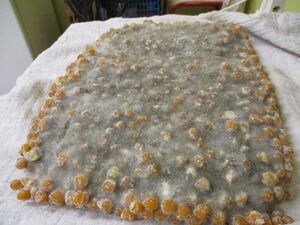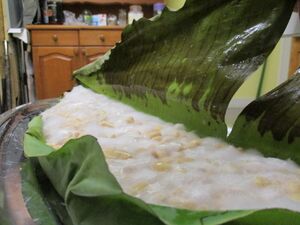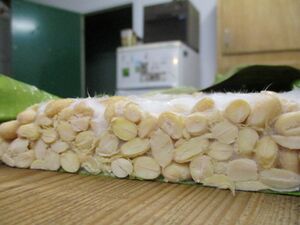Tempeh making 35c3: Difference between revisions
(Created page with "thumb|right|Tempeh made in cloth thumb|right|Tempeh in banana leave ...") |
No edit summary |
||
| Line 3: | Line 3: | ||
[[Image:Tempeh_banana_leave_cut_close_up_1600_faa08092017.jpg|thumb|right|Tempeh cut close up]] | [[Image:Tempeh_banana_leave_cut_close_up_1600_faa08092017.jpg|thumb|right|Tempeh cut close up]] | ||
[ To secure spot on this workshop please sign in here.] | [https://dudle.inf.tu-dresden.de/tempehmaking35c3/ To secure spot on this workshop please sign in here.] | ||
[https://foodhackingbase.org/wiki/Recipe:Tempeh_making_manual_-_short_workshop_form Workshop manual is shared here.] | [https://foodhackingbase.org/wiki/Recipe:Tempeh_making_manual_-_short_workshop_form Workshop manual is shared here.] | ||
Latest revision as of 17:11, 5 December 2018
To secure spot on this workshop please sign in here.
Workshop manual is shared here.
This workshop is an introduction to soybean fermentation. It will take you through the preparation of the soybeans or other legumes (most likely chickpeas), inoculation of the beans with the microbial culture and the subsequent harvesting and aging - your ferment should be ready for preparation and eating on the Day 3. We will focus on tempeh cultured by Rhizopus oligosporus which is nice and easy opening for beginners.
The diversity of the ferments which can be prepared from soybeans (and other legumes) is truly amazing, depending on the cultures (microbes) being used and conditions/techniques applied (and of course the treatment of the soybeans). In this workshop we will go through the basic steps which will secure proper preparation of the chickpeas as a substrate for the microbes to inoculate it with. Optimal fermentation conditions will be discussed and devices making it easy to establish them suggested (Experimental Incubator for example). We will be also harvesting/preparing the previously made tempeh and as usually tasting samples of the final products. The results of this workshop should be ready for tasting on Day 3 (48 hours of fermentation at 25-30°C is sufficient). We will do our best to provide the participants with adequate starter cultures for their experiments, at least for batch or two, you should however get your own starter, more info below.
This workshop is based on donation at your will no one turned away for lack of funds. If you can afford to donate, please do I Algoldor am investing around €1000 to be at 35c3 in "all the glory" and would be very happy to cover as much of this sum as possible as long as fhb group is in agreement with it.
For the past three years or so we are using starter from Topcultures company based in Belgium. It works very well and it is well priced, for €20-30 you will have enough to play for a year or so I would say.


